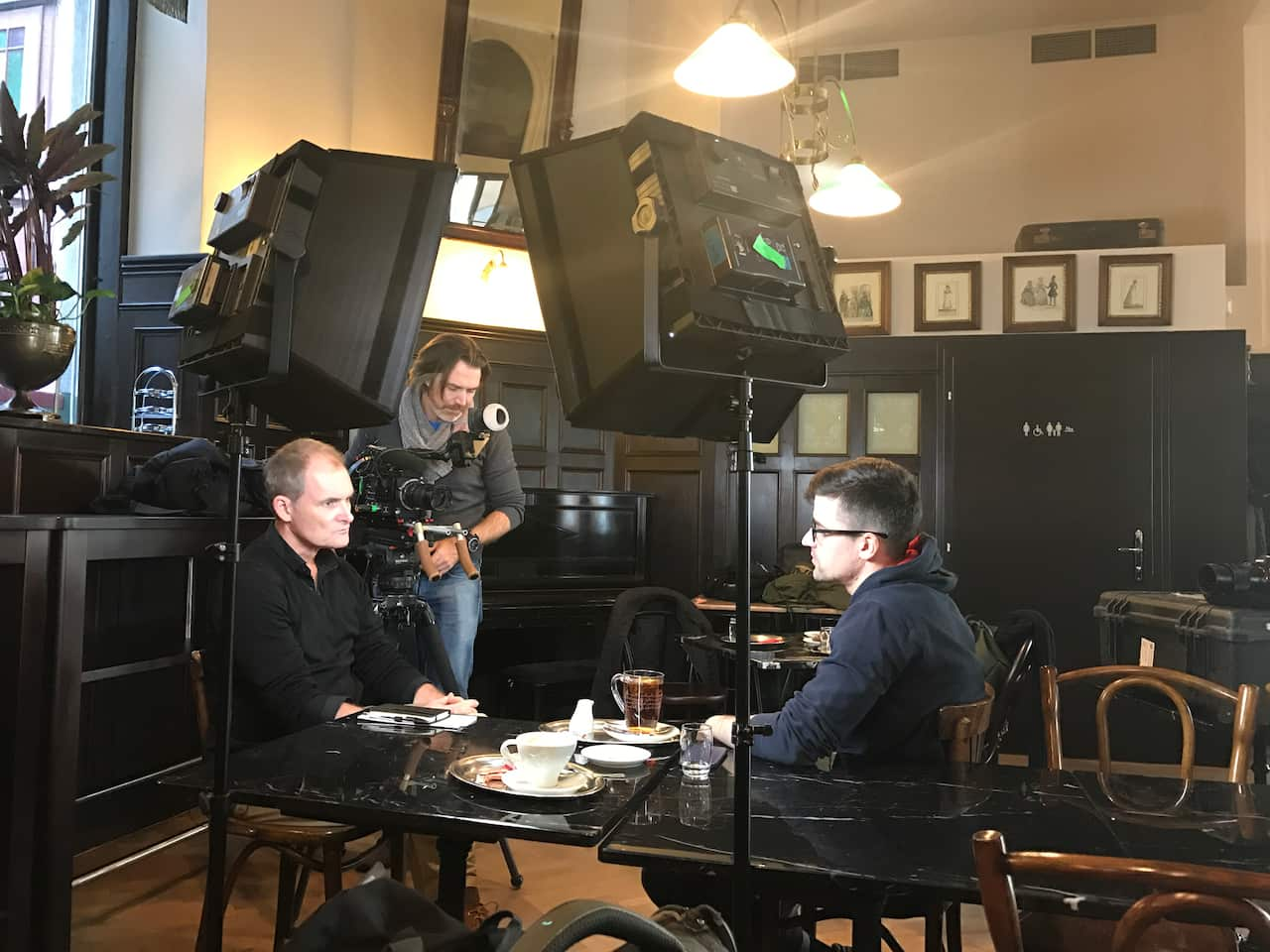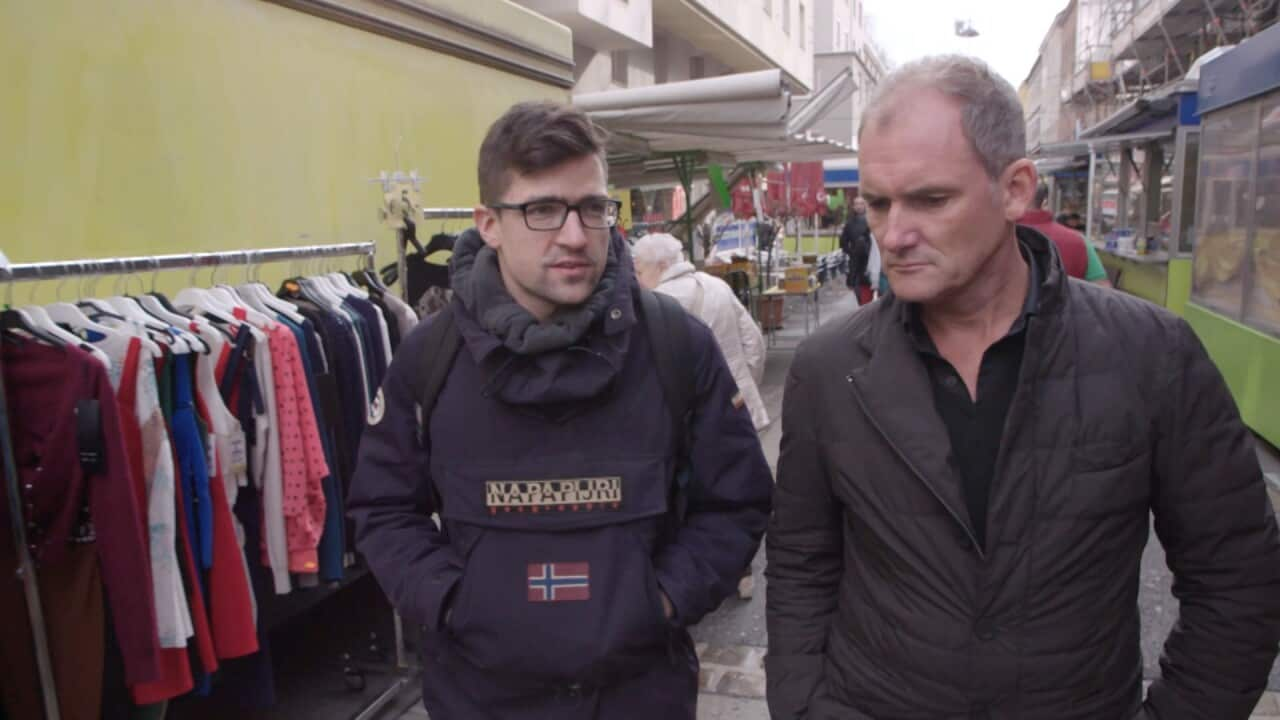The first time I meet Martin Sellner is outside a McDonalds in central Vienna, not far from one the city’s main universities.
Young, clean-cut and instantly likeable, he’s one of the faces of a new far right activist group growing in popularity and spreading through Europe; the Identitarians.
As soon as we start talking over our first proper Viennese coffee, the first thing I notice is Martin’s energetic enthusiasm for a wide-range of topics that cut across the political debates now raging in Europe – immigration, race, terror attacks, nationalism, a youth increasingly cynical of the existing political order, disenfranchised and febrile populations outside the multicultural urban centres.
I find he has academic approach to his beliefs and ideas, and comes across as someone who has thought in detail about what he believes. He has sophisticated ways of expressing his views and has developed sharp counter-arguments to those who call him extreme, right-wing or racist – often instantly delivered in a way that makes me think he has used them repeatedly.
The Identitarians see themselves as the defenders of white European identity. They say they’re not racist and aren’t opposed to immigration in principle, but believe there is a danger that new migrants, especially from Muslim countries, will eventually overtake and dominate the existing white populations, if such immigration is not severely controlled or stopped.
It is a sentiment I have heard in many parts of Europe and the UK, often based on misconceptions about the real figures but also rooted in what people think they are seeing around them – change, increased insecurity, job losses and changing economic models. For example, Martin brings up the “problematic” sections of French cities, which are predominately Muslim, where there are issues of integration among populations usually of North African descent. I tell him this is largely a result of France importing labour from its former colonies after World War II. Martin immediately counters; “exactly, an example of the politicians making political decisions without thinking through the longer-term social consequences”.
It is not what I was expecting from a far right leader and is miles away from discussions I have had with many people and politicians opposing further large-scale immigration in the UK who basically just don’t want migrants even if they live in cities where there are barely any.
I was meeting Martin for a Dateline story I was reporting on his group, and their place in a broader shift to the right, or at least more nationalist politics, happening across Europe.
Shortly after we meet Martin points out the Identitarians have sued an Austrian TV channel for calling his group Nazi, a warning that we should be careful with our language.
He adamantly insists they are not, and that they don’t agree with the National Socialist idea of Aryan racial superiority – or any racial superiority for that matter. Again I am struck by the strategic thinking that has gone into this – the way a group is described means everything to its attempt at greater acceptability – and that is exactly what the Identitarians are about. It is what makes them different to other far right groups that have gone before them and is what makes them fascinating to me as a journalist.

When I question Martin about his past links to neo-Nazis he admits he’s had associations with what he calls “nationalist forces”, but says that was because they were the only groups voicing what he terms “patriotic views”.
In his own words, Martin believes many well-educated, middle class, young Europeans have been desperate for a “third way” approach to these testing issues – a forum, which disavows extremist, neo-Nazi ideas of supremacy, but can criticize a policy of multiculturalism and further immigration without being labeled racist. They are issues that have been dramatically heightened across Europe with the Islamist terror attacks, especially in France, and the record numbers of refugees and economic migrants across the Mediterranean and across land each summer for the past three years.
Surely, I say, Austria is rich enough to help give these people in dire need some sanctuary. Yes Martin agrees – but let’s help them stay in their regions until war ends and they can return home. What about those already here? They don’t want to deport all Muslims, but they do want to deport Muslims who are in Europe illegally, or have been involved in terror or crime.
Perhaps the most interesting aspect of the Identitarians is their approach to activism, which borrows from models that have been hugely successful for groups such as Greenpeace.
In his studio apartment Martin proudly shows me his laptop, mic and camera setup. It’s his “information war HQ”, which he uses to upload blogs, vlogs and videos direct to the group’s main audience; 15-25 year olds who get most of their news online instead of on TV or newspapers. “We are breaking the firewall of political correctness,” Martin tells me of the Identitarians’ online strategy. He delivers his online talks in a measured tone, a bit like he’s sitting next to you in the student café.
To create material to post on social media, the group regularly performs high-profile stunts, which they film and either stream live to Facebook and YouTube, or post shortly after.
In one example they placed a burqa over one of Vienna’s most well-known landmarks, a statue of Austria’s famous Empress Maria Theresa: “The message was if you don't stop what's happening now, that will be the future of Vienna,” Martin told me. “All our heritage, what she was fighting for, what she built up, it’s destroyed now by our politicians.”
I also spoke to those, especially from the left, who call the Identitarians fascist extremists, even Nazis.
But language is very important here and has to be carefully chosen.
'The new face of the Far Right'
There is no doubt the Identitarians are tapping in and giving a voice to a growing number of Europeans troubled by terror attacks and changing societies, where there are problems of integration in some situations.
These are the sentiments that are partly driving the new “nationalism” emerging in Europe, the febrile fears that partly resulted in Brexit and increased seats for far right parties in several European countries. It is a voice of protest at change that has felt itself stifled or at least hasn’t had an “acceptable” venue to express itself.
This is the space the Identitarians say they are are occupying – a space of pride in their European identity, rather than explicit racism and Islamophobia. One of their key phrases ‘Europe, Youth, Reconquista’, sums up their view that Europe needs to be “retaken” or protected from immigration, especially Msulim immigration.
The Identitarians have roughly 400 members in Austria and claim 10,000 online supporters and donors. They are also very active in France, Italy and now Germany.
They are positioning themselves as the voice for worried and disaffected youth. If they continue to grow, it will make them valuable to political parties in the future.
It could see the Identitarians dragging European politics more towards right wing nationalism in the future, with urbane, educated leaders such as Martin Sellner playing a key role.
Dateline is an award-winning Australian, international documentary series airing for over 40 years. Each week Dateline scours the globe to bring you a world of daring stories. Read more about Dateline
Have a story or comment? Contact Us


